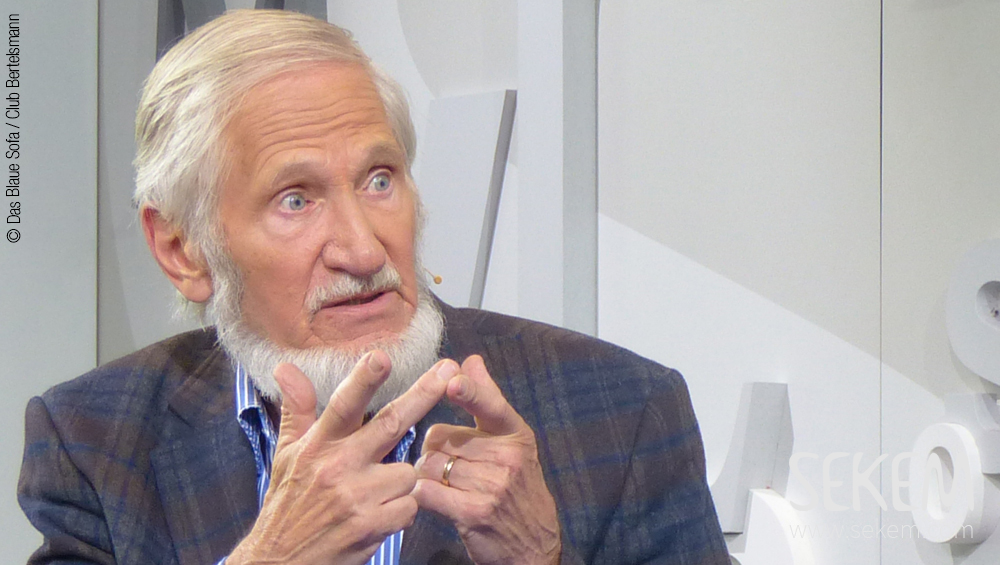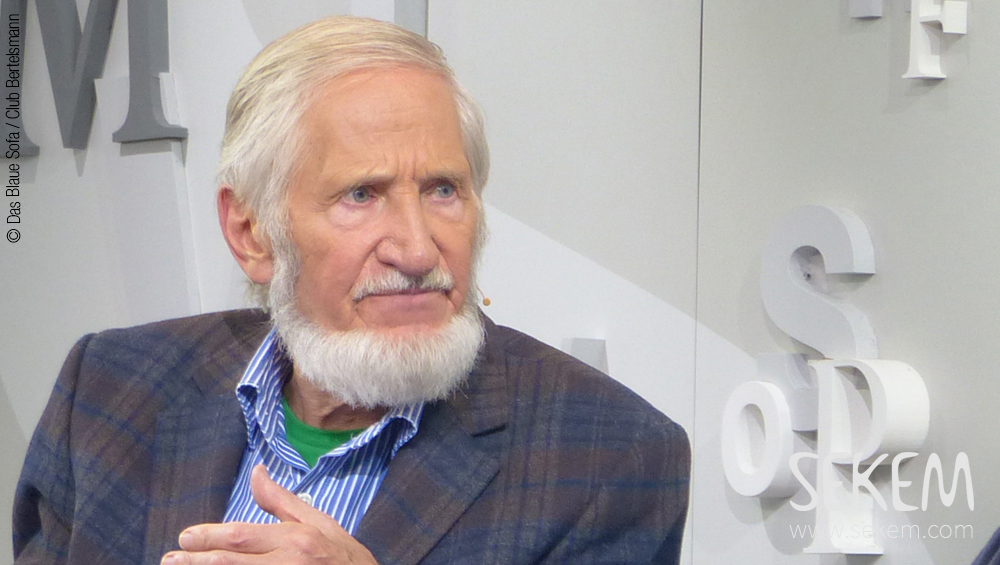An Interview with Rupert Neudeck
Almost at the same time when Dr. Ibrahim Abouleish began creating his “miracle in the desert” by founding SEKEM, Rupert Neudeck set out to launch his venture at the other end of the world: with his ship the “Cap Anamur”, he saved the lives of several thousands of Vietnamese refugees. Recently, the well-known human rights activist visited SEKEM again and spoke with SEKEM Insight about why SEKEM “has everything that the great utopias of mankind are proclaiming” and how his aid agency “Grünhelme” (“green helmets”) and SEKEM could cooperate and support refugees in Egypt.
SEKEM Insight: Mr. Neudeck, you are a human rights activist and well known for your social engagement worldwide. With the ‘Cap Anamur’ you made history and it seems that you dedicated your life to helping people in need through many small miracles. After visiting SEKEM for the second time, you have said that it appears to you like a world that you were not expecting to find on earth. What impresses you the most when thinking of SEKEM?
Rupert Neudeck: SEKEM has everything that the great utopias of mankind are pathetically proclaiming, but without ideological and utopian ballast. The vision of a community of producers, teachers and learners, the collaboration between nature and civilisation – all this was announced by the great utopias. Most of these utopias disappeared and broke down. SEKEM was built and remains powered by its founder and the community. Additionally, the initiative and its vision are supported by an “invisible sphere” of tolerance and goodwill. Besides, the fact that SEKEM is not depending on subsidies or welfare is very important. What Albert Camus once wrote about Sisyphus, can be said about the people I met in SEKEM: I can imagine them happy.
“The main thoughts and requirements for a future society are laid down here…”
SI: How did you get to know SEKEM?
R.N.: I knew about SEKEM by giving speeches at Waldorf Schools that also helped me to realize wonderful activities, such as the building of a school in Afghanistan (financed by donations of 40,000 Euro). During this time I got to know a very important and impressive monthly anthroposophical journal, which sometimes seemed to me like a journalistic side of SEKEM: an open space in which hatred does not have a place. At the same time, I also contacted Dr. Ibrahim Abouleish after I had read his book “The SEKEM Vision”. I immediately wanted to visit this utopian jewel to convince myself of its reality.
SI: Do you observe any significant changes in SEKEM since your last visit in 2011?
R.N.: I can now actually visit the Heliopolis University for Sustainable Development that I had always called a “utopian project”. Now it has become a reality… However, before my visit this year, some recent news also worried me: How can such an organism survive the chaos of changing authorities after the systems that have been established by Nasser, Sadat and Mubarak disappeared? Luckily, I could see that SEKEM did survive.
SI: According to our knowledge, the SEKEM model is unique in the world and replicating it is hard to do, as the circumstances and challenges are different in every single location. Do you think that European countries, too, could learn something from or even adopt the SEKEM vision?
R.N.: Yes, certainly! SEKEM was founded by an Egyptian from the Nile delta and has been tailored to this region. But still: The main thoughts and requirements for a future society are laid down here – that nature has to be protected and that economic activity must be carefully expanded while remaining competitive on global markets. People shall feel safe while being able to express their different beliefs and live according to their religious customs. SEKEM would be a model for whole regions in Europe that are going to be destroyed by our European revolution of urbanism. Countrysides may disappear soon. They could benefit a lot from such communities as SEKEM, which I see as cooperatives of production and at the same time a community of friends.
“SEKEM is the opposite of a world of separated dimensions…”
SI: You are not only committed to great actions but also familiar with the humanities. You graduated in philosophy and German studies with a Ph.D. thesis about “The political ethic of Jean-Paul Sartre and Albert Camus”. You cooperated very closely with the great humanist, writer, and activist Heinrich Böll. Do the humanities still play a role in your life? Do they influence your daily work?
R.N.: I experienced my PhD thesis as great luck as it was much more than a worthless academic apprentice piece. I had the unique chance to see things from the perspective of two great writers and philosophers of the post-war years. Besides, those two can tell us a lot that is eminently useful to our humanitarian work. The novel “The Plague” by Albert Camus became something like a vade mecum for me and many other humanitarian activists (no matter if doctors, engineers or craftsmen). All in all, the days of my studies have been very enriching, although I also discovered a lot of conceit in the sciences at the same time. I later experienced the other side of the coin while doing practical work with carpenters, masons and nurses.
SI: At SEKEM, cultural life has the same value as societal life, ecology, and economic activity. How do you perceive this approach? Do you think that it is important to find a balance between these four dimensions?
R.N.: These four dimensions should be important to everyone living in a free country. For me, religion takes the role of a fifth dimension, which is, by the way, represented in SEKEM too, but in a more subtle way. SEKEM is the opposite of a world of separated dimensions that I sense in the European civilisation. In Europe, we need different ministries, working fields, walls and fences between the dimensions. In SEKEM, everyone strives to tear down the walls that limit people’s development.

SI: By saving the so called “boat people” some years ago, you became very popular very quickly. Until today, you have been fighting for refugees all over the world. How is Egypt handling the increasing number of refugees in the country?
R.N.: The refugees are not really accepted in Egypt. The government is too busy with security issues so that they don’t care about the refugees. They could offer them opportunities where they could settle, but they strictly reject that. Nevertheless, I hope that in the future people will become more peaceful so that others are able to settle down and be productive in Egypt.
SI: How could SEKEM support refugees in Egypt?
R.N.: Amongst the African refugees there are, for instance, the Eritreans and Somalis who do not have any chance to return to their country. If Egypt would offer them the chance to learn a vocation, that would help them a lot to receive the necessary qualifications in Europe, the USA, or Canada. I think that, later on, there are good possibilities in Europe, especially in Germany, for them to become productive members of society. Hence, we could try to offer a vocational training for them in the framework of the already existing SEKEM institutions.
SI: You recently visited SEKEM with your aid agency “Grünhelme” (“Green Helmets”) that is committed to the establishment and reconstruction of communal structures and social, ecological, cultural, and religious institutions. How might cooperation between the “Grünhelme” and SEKEM look like?
R.N.: I think there are great preconditions for cooperation. The “green helmets” have been embodying many of SEKEM’s core ideals since their foundation, but without any formal programme or ideology. Through direct cooperation, for example by offering Eritreans and Somalis vocational training opportunities in SEKEM, we could benefit from each other’s appreciation and work experience.
“SEKEM as a resistance model against the craze of growth and prosperity…”
SI: In your current book “Radikal leben” (“living radically”) you are emphasising on “how important and essential actual, practical resistance, radical rethinking, and courageous intervention are – for today’s societies and for each of us.” Do you perceive this kind of “radicalism” in SEKEM, too?
R.N.: On the one hand, the perseverance of the founder Dr. Ibrahim Abouleish and his close colleagues who promoted the initiative for years and even decades and who never gave up – this was and is resistance par excellence. On the other hand, I see SEKEM as a resistance model against the craze of growth and prosperity – as well as the craze of money and avarice. I really wish for all of us that we will be spared from that in the future. In SEKEM almost everything is radical, but without an “advertising department” that is systematically pushing us to believe in it.
Interview: Christine Arlt
Read more about Rupert Neudecks SEKEM-visit in German
Get to know the "Grünhelme"

